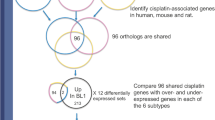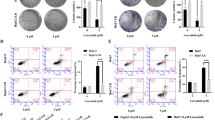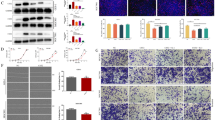Abstract
The present study aims to investigate the roles of TCF4 and its underlying mechanism in colorectal cancer (CRC). Doxorubicin-resistant DLD-1 (DLD1 DR), TCF4 overexpression, and TCF4 knockdown cell lines were constructed. A flow cytometer was used to analyze frequencies of CD133+ cell in the DLD1 and DLD1 DR cells. Quantitative real-time PCR (qPCR) was used to determine the expressions of cancer stem cell (CSC) makers. Stemness of CRC cells were determined using tumorsphere formation assay. The correlation between TCF4 and ZEB1/ZEB2 were determined using public data from The Cancer Genome Atlas (TCGA) datasets. ZEB1/ZEB2 overexpression cell lines were constructed and cell viabilities were then determined using MTT and colony formation assays. TCF4 overexpression promoted proliferation of CRC cell lines and relative expressions of TCF4 were significantly increased in the DLD1 DR cells. TCF4 overexpression promoted CRC cell doxorubicin resistance, whereas TCF4 knockdown significantly decreased doxorubicin resistance. Additionally, TCF4 overexpression also significantly increased frequencies of CSC cells, expressions of CSC markers, and CRC ability to form tumorsphere. Furthermore, TCF4 promoted ZEB1 and ZEB2 expression, leading to CRC proliferation and doxorubicin resistance. TCF4 promoted CRC doxorubicin resistance and stemness by regulating expressions of ZEB1 and ZEB2.





Similar content being viewed by others
References
Amiel J et al (2007) Mutations in TCF4, encoding a class I basic helix-loop-helix transcription factor, are responsible for Pitt-Hopkins syndrome, a severe epileptic encephalopathy associated with autonomic dysfunction. Am J Hum Genet 80:988–993
Borowicz S, Van Scoyk M, Avasarala S, Rathinam MKK, Tauler J, Bikkavilli RK, Winn RA (2014) The soft agar colony formation assay. J Visual Exper 92:e51998
Chiou SH et al (2010) Coexpression of Oct4 and Nanog enhances malignancy in lung adenocarcinoma by inducing cancer stem cell-like properties and epithelial-mesenchymal transdifferentiation. Cancer Res 70:10433–10444. https://doi.org/10.1158/0008-5472.CAN-10-2638
Chu E, Drake JC, Koeller DM, Zinn S, Jamis-Dow CA, Yeh GC, Allegra CJ (1991) Induction of thymidylate synthase associated with multidrug resistance in human breast and colon cancer cell lines. Mol Pharmacol 39:136–143
Clarke MF, Hass AT (2006) Cancer stem cells reviews in cell biology and molecular medicine
Dalerba P et al (2007) Phenotypic characterization of human colorectal cancer stem cells. Proc Natl Acad Sci 104:10158–10163
Darnell JE Jr (2002) Transcription factors as targets for cancer therapy. Nat Rev Cancer 2:740
Dave N, Guaita-Esteruelas S, Gutarra S, Frias À, Beltran M, Peiró S, de Herreros AG (2011) Functional cooperation between Snail1 and twist in the regulation of ZEB1 expression during epithelial to mesenchymal transition. J Biol Chem 286:12024–12032
de Pontual L, Mathieu Y, Golzio C, Rio M, Malan V, Boddaert N, Soufflet C, Picard C, Durandy A, Dobbie A, Heron D, Isidor B, Motte J, Newburry-Ecob R, Pasquier L, Tardieu M, Viot G, Jaubert F, Munnich A, Colleaux L, Vekemans M, Etchevers H, Lyonnet S, Amiel J (2009) Mutational, functional, and expression studies of the TCF4 gene in Pitt-Hopkins syndrome. Hum Mutat 30:669–676
Dylla SJ et al (2008) Colorectal cancer stem cells are enriched in xenogeneic tumors following chemotherapy. PLoS One 3:e2428
Forrest MP, Hill MJ, Quantock AJ, Martin-Rendon E, Blake DJ (2014) The emerging roles of TCF4 in disease and development. Trends Mol Med 20:322–331. https://doi.org/10.1016/j.molmed.2014.01.010
Ishii Y, Hasegawa H, Endo T, Ochiai H, Kitagawa Y (2011) Current view and possibilities of chemotherapy sensitivity and resistance assays and metabolic enzyme analysis in individualized chemotherapy for the patients with colorectal cancer. Nihon Rinsho 69 Suppl 3:487–493
Johnson S, Chen H, Lo P (2013) In vitro tumorsphere formation assays. Bio-protocol 3:e325
Lambert M, Jambon S, Depauw S, David-Cordonnier MH (2018) Targeting transcription factors for cancer treatment. Molecules. https://doi.org/10.3390/molecules23061479
Leng Z et al (2013) Kruppel-like factor 4 acts as an oncogene in colon cancer stem cell-enriched spheroid cells. PLoS One 8:e56082. https://doi.org/10.1371/journal.pone.0056082
Libermann TA, Zerbini LF (2006) Targeting transcription factors for cancer gene therapy. Curr Gene Ther 6:17–33
Liu C et al (2015) Activating transcription factor 4 promotes angiogenesis of breast cancer through enhanced macrophage recruitment. Biomed Res Int 2015:974615. https://doi.org/10.1155/2015/974615
Liu C, Zhao J, Liu Y, Huang Y, Shen Y, Wang J, Sun W, Sun Y (2016) A novel pentacyclic triterpenoid, ilexgenin A, shows reduction of atherosclerosis in apolipoprotein E deficient mice. Int Immunopharmacol 40:115–124. https://doi.org/10.1016/j.intimp.2016.08.024
Lodestijn SC, Lenos KJ, Miedema DM, Bijlsma MF, Vermeulen L (2019) Cancer stem cells: here, there, and everywhere. Mol Cell Oncol 6:1540235. https://doi.org/10.1080/23723556.2018.1540235
Longley DB, Allen WL, Johnston PG (2006) Drug resistance, predictive markers and pharmacogenomics in colorectal cancer. Biochim Biophys Acta (BBA)-Rev Cancer 1766:184–196
Reya T, Morrison SJ, Clarke MF, Weissman IL (2001) Stem cells, cancer, and cancer stem cells. Nature 414:105
Riganti C, Miraglia E, Viarisio D, Costamagna C, Pescarmona G, Ghigo D, Bosia A (2005) Nitric oxide reverts the resistance to doxorubicin in human colon cancer cells by inhibiting the drug efflux. Cancer Res 65:516–525
Shang W et al (2018) Genome-wide CRISPR screen identifies FAM49B as a key regulator of actin dynamics and T cell activation. Proc Natl Acad Sci 115:E4051–E4060
Siegel RL, Miller KD, Fedewa SA, Ahnen DJ, Meester RGS, Barzi A, Jemal A (2017) Colorectal cancer statistics. CA Cancer J Clin 67:177–193. https://doi.org/10.3322/caac.21395
Soveri LM, Lamminmaki A, Hanninen UA, Karhunen M, Bono P, Osterlund P (2019) Long-term neuropathy and quality of life in colorectal cancer patients treated with oxaliplatin containing adjuvant chemotherapy. Acta Oncol. https://doi.org/10.1080/0284186X.2018.1556804
Strumberg D, Harstrick A, Doll K, Hoffmann B, Seeber S (1996) Bendamustine hydrochloride activity against doxorubicin-resistant human breast carcinoma cell lines. Anti-Cancer Drugs 7:415–421
Yang J-Y, Hung M-C (2009) A new fork for clinical application: targeting forkhead transcription factors in cancer. Clin Cancer Res 15:752–757
Yang H et al (2015) Ilexgenin A induces B16-F10 melanoma cell G1/S arrest in vitro and reduces tumor growth in vivo. Int Immunopharmacol 24:423–431. https://doi.org/10.1016/j.intimp.2014.12.040
Yoshihara K, Tajima A, Komata D, Yamamoto T, Kodama S, Fujiwara H, Suzuki M, Onishi Y, Hatae M, Sueyoshi K, Fujiwara H, Kudo Y, Inoue I, Tanaka K (2009) Gene expression profiling of advanced-stage serous ovarian cancers distinguishes novel subclasses and implicates ZEB2 in tumor progression and prognosis. Cancer Sci 100:1421–1428
Author information
Authors and Affiliations
Corresponding author
Ethics declarations
Conflict of interest
The authors declare that they have no conflict of interest.
Research involving human participants and/or animals
All applicable international, national, and/or institutional guidelines for the care and use of animals were followed.
Informed consent
Not applicable.
Additional information
Handling Editor: Jörn Bullerdiek
Publisher’s note
Springer Nature remains neutral with regard to jurisdictional claims in published maps and institutional affiliations.
Rights and permissions
About this article
Cite this article
Sun, S., Yang, X., Qin, X. et al. TCF4 promotes colorectal cancer drug resistance and stemness via regulating ZEB1/ZEB2 expression. Protoplasma 257, 921–930 (2020). https://doi.org/10.1007/s00709-020-01480-6
Received:
Accepted:
Published:
Issue Date:
DOI: https://doi.org/10.1007/s00709-020-01480-6




